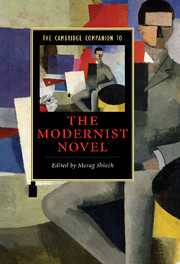Book contents
- Frontmatter
- Reading the modernist novel: an Introduction
- 1 Modernists on the art of fiction
- 2 Early modernism
- 3 Remembrance and tense past
- 4 Consciousness as a stream
- 5 The legacies of modernism
- KEY NOVELISTS
- 6 James Joyce and the languages of modernism
- 7 Tradition and revelation: moments of being in Virginia Woolf’s major novels
- 8 Wyndham Lewis and modernist satire
- 9 D. H. Lawrence: organicism and the modernist novel
- 10 Joseph Conrad’s half-written fictions
- 11 Djuna Barnes: melancholic modernism
- 12 William Faulkner: an impossibly comprehensive expressivity
- 13 Writing lives: Dorothy Richardson, May Sinclair, Gertrude Stein
- 14 C. L. R. James, Claude McKay, Nella Larsen, Jean Toomer the ‘black Atlantic’ and the modernist novel
- 15 Situating Samuel Beckett
- Further reading
- Index
10 - Joseph Conrad’s half-written fictions
from KEY NOVELISTS
Published online by Cambridge University Press: 28 July 2007
- Frontmatter
- Reading the modernist novel: an Introduction
- 1 Modernists on the art of fiction
- 2 Early modernism
- 3 Remembrance and tense past
- 4 Consciousness as a stream
- 5 The legacies of modernism
- KEY NOVELISTS
- 6 James Joyce and the languages of modernism
- 7 Tradition and revelation: moments of being in Virginia Woolf’s major novels
- 8 Wyndham Lewis and modernist satire
- 9 D. H. Lawrence: organicism and the modernist novel
- 10 Joseph Conrad’s half-written fictions
- 11 Djuna Barnes: melancholic modernism
- 12 William Faulkner: an impossibly comprehensive expressivity
- 13 Writing lives: Dorothy Richardson, May Sinclair, Gertrude Stein
- 14 C. L. R. James, Claude McKay, Nella Larsen, Jean Toomer the ‘black Atlantic’ and the modernist novel
- 15 Situating Samuel Beckett
- Further reading
- Index
Summary
On 31 May 1902, the 44-year-old Joseph Conrad (1857-1924) wrote to William Blackwood of Blackwood’s publishing house. In a respectful but nonetheless assertive letter, Conrad accepts that he is 'long in [his] development' (his first novel was published in 1895), cites the precedents of William Makepeace Thackeray, Sir Walter Scott and George Eliot, and then distinguishes himself from these illustrious predecessors.
But these are great names. I don't compare myself with them. I am modern, and I would rather recall Wagner the musician and Rodin the Sculptor who both had to starve a little in their day - and Whistler the painter who made Ruskin the critic foam at the mouth with scorn and indignation. They too have arrived. They had to suffer for being 'new'.
'Modern'. 'New'. The immediate force of these key words in Conrad’s letter is, to put it bluntly, to explain the relative unprofitability of his fiction: in the paragraph prior to the one from which his comments are taken, Conrad refers ironically to the present as 'a time when Sherlock Holmes looms so big'. He was clearly aware that there were different ways in which a writer could be modern or new. On the one hand is the newness associated with technical or formal innovation and originality, and on the other hand the newness established by the use of aspects of social or cultural modernity as fictional subject matter. Both Conrad’s lifelong friend John Galsworthy, and H. G. Wells, with whom his friendship was much more up and down, were clearly modern in the second of these two senses, but less so if at all in the first. (Along with Arnold Bennett, they form the trio of 'Edwardians' criticized by Virginia Woolf in her essay 'Mr Bennett and Mrs Brown', 1924, and dubbed 'materialists' in her essay 'Modern Fiction', 1919.)
- Type
- Chapter
- Information
- The Cambridge Companion to the Modernist Novel , pp. 151 - 164Publisher: Cambridge University PressPrint publication year: 2007
- 1
- Cited by



